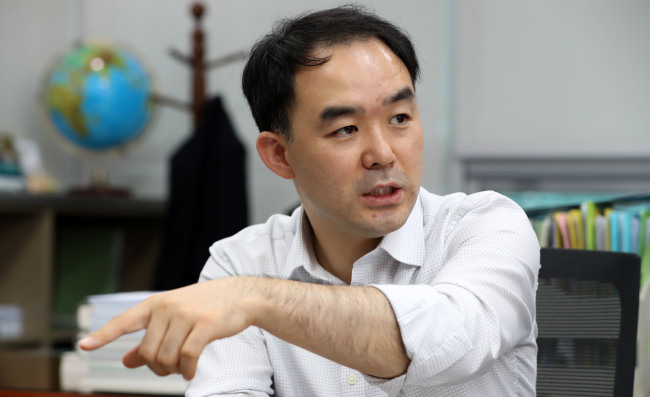[Herald Interview] Activist-turned-lawmaker takes aim at chaebol
Chaebol model fundamentally flawed, needs urgent reform, says Rep. Chae
By Korea HeraldPublished : Aug. 23, 2016 - 17:00
Expectations are high that South Korea’s family-run conglomerates, or chaebol, will face increasing pressure to reform their corporate governance, especially with more liberals than ruling conservatives in the current Parliament.
One individual in favor of such pressure is Chae Yi-bai, a 41-year-old rookie lawmaker from the minor opposition People’s Party.
“The chaebol model is fundamentally flawed and it is crippling the mechanism of Korea’s capital market,” the activist-turned-lawmaker said last month at his office at the National Assembly in Yeouido, Seoul.
One individual in favor of such pressure is Chae Yi-bai, a 41-year-old rookie lawmaker from the minor opposition People’s Party.
“The chaebol model is fundamentally flawed and it is crippling the mechanism of Korea’s capital market,” the activist-turned-lawmaker said last month at his office at the National Assembly in Yeouido, Seoul.

Tycoons who control groups like Samsung, Hyundai Motor and SK wield 100 percent control over the companies with less than 1 percent of their equities, so they have no incentives to improve their companies’ market value, boost stock prices or pay dividends to shareholders, he said.
“As the market mechanism doesn’t really matter in this chaebol model, the so-called owners have other incentives -- to use corporate fortunes for their person interests.”
This is why the usurpation of corporate opportunities is rampant among chaebol, he said.
Chaebol families set up a private company -- for example, an IT solutions provider or a logistics company -- and channel a big chunk, if not all, of the group’s contracts to this company. Profits sharply rise and the company debuts on the stock market, delivering a windfall for the family which owns it.
Hyundai Glovis, Hyundai Motor’s auto-shipping unit, was founded by the group’s chairman Chung Mong-koo and his son Eui-son in 2001, with an initial capital of 3 billion won ($2.69 million). It is now worth 6.3 trillion won, having grown explosively on exclusive shipping contracts from Hyundai Motor and Kia.
Glovis, now listed and 23 percent owned by the chairman’s son, is seen as a key vehicle for the heir in his quest to obtain control over the entire group.
“It’s like there is not a single chaebol group not doing this. It’s such an easy way to pass down the control to the heirs without paying taxes,” the lawmaker said.
Before joining politics, Chae was a corporate governance activist for 18 years, affiliated with the civic group Solidarity for Economic Reform. His main area of focus has been chaebol families swindling corporate opportunities for their personal interests.
Laws have been amended to address the issue since 2006 when Chae and others at the Solidarity for Economic Reform first brought the issue to the public’s attention.
“But they are not enough to root out the practice. It still remains a valid option for chaebol groups planning succession,” he stressed.
Hyundai Motor’s Chung family has reduced their holding of Glovis shares to less than 30 percent, after a ban on intragroup deals was imposed on listed companies more than 30 percent owned by the group’s controlling family. The bar is lower at 20 percent for non-listed companies.
Rep. Chae recently submitted a legislative motion to lower it to 20 percent for both listed and non-listed companies.
The usurpation issue embodies all the problems of the chaebol model, he continued.
If the Chung family had not created Glovis, Hyundai Motor or Kia could have shipped cars to customers in direct contracts with owners of car carrier trailers or signed with independent partners offering more competitive rates. In both cases, much of Glovis’ profits are unnecessary costs spent on the side of Hyundai Motor or Kia, he explained.
“Fair competition is undermined, in this case, with other providers of the same services. So is the shareholder value of Hyundai Motor and Kia.”
He believes that Korea must act now to reform the flawed chaebol and win back the trust of global investors.
“In the past few years, a series of events have convinced foreigners that Korean companies deserve discounts for corporate governance risks,” he said.
Among high-profile incidents include Hyundai Motor’s over $10 billion purchase of land in Seoul’s upscale Gangnam and the proxy battle between Samsung and US activist fund Elliott over the merger between the Korean group’s construction and fashion businesses.
“Chaebol have since come up with measures to increase shareholder incentives and improve corporate governance. But it will take time before Korea sees real changes,” he said.
The lawmaker expressed hope for the coming generation of chaebol leaders.
“This young group of heirs, having been educated in the West, may have a different mindset from their parents’ generation when it comes to shareholder value,” he said.
By Lee Sun-young (milaya@heraldcorp.com)
-
Articles by Korea Herald



![[Herald Interview] 'Amid aging population, Korea to invite more young professionals from overseas'](http://res.heraldm.com/phpwas/restmb_idxmake.php?idx=644&simg=/content/image/2024/04/24/20240424050844_0.jpg&u=20240424200058)













![[KH Explains] Korean shipbuilding stocks rally: Real growth or bubble?](http://res.heraldm.com/phpwas/restmb_idxmake.php?idx=652&simg=/content/image/2024/04/25/20240425050656_0.jpg&u=)

